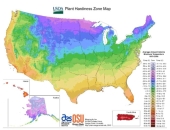I haven't seen this mentioned much in the mainstream press, but the new USDA Plant Hardiness Zone Map shows some shifts in zone for many regions.
My own went from 6b to 7a.
I'm in a unique position to have returned to a place where I'd gardened in the past after 20 years away, so I can compare then to now. What I've observed:
- far fewer viceroy and monarch butterflies
- far fewer insects of all types
- it's now frequently too hot to grow many annuals in the fall season
- some plants that would die in winter previously, such as lavender and rosemary, can now sometimes overwinter
- armadillos are moving up from the south to our area
- declines in bird species, even once-common ones like blue jays
What I've done in response to weather trends:
- literally stopped buying seeds from an outlet one state to the north of us and instead purchase from two suppliers south of us, which has given better results
- with an assist from heat-sink rocks, overwinter tender perennials
- cut back on my late summer/fall crops
- shifted into more lacto-fermentation and dehydrating to store in a basement that stays 50-68 year round
- cut cool-weather lovers such as arugula and chamomile from my rotation
- adding more heat lovers
Ref:
Article in Civil Eats on the new zone map
Has your zone changed? Does the zone map match your observations? What are the implications for your gardening plans, now and in the future?






